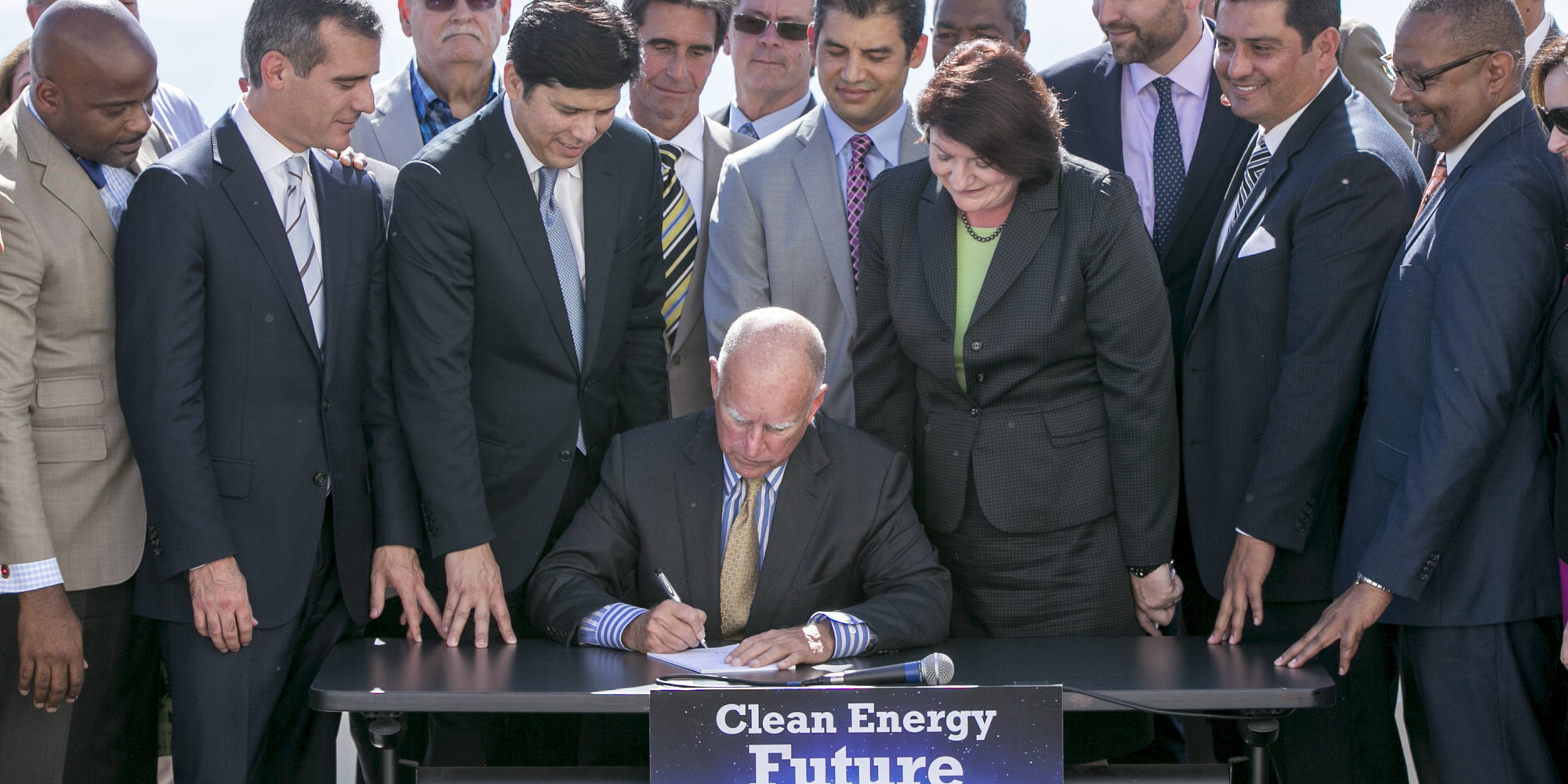Gov. Brown signs controversial new climate bills

Over staunch opposition on his right, Gov. Jerry Brown signed several new climate bills into law, aiming to keep California on the regulatory trajectory first set during former Gov. Arnold Schwarzenegger’s administration.
That suite of laws, “in which polluters pay to offset emissions under a declining cap, is on tenuous footing amid litigation and uncertainty in the Legislature,” the Sacramento Bee noted. The idea of a new set of rules, “negotiated by Brown and legislative leaders last month, was significant to many moderate Democrats who viewed spending in their districts as critical to buttress a state climate program that has faced heavy resistance from industry,” the paper added.
Complex divisions
Some Democrats with that stance have worried that national and statewide populist sentiment could pose an especially sharp threat to their political fortunes this election year. Complicating the ideological picture still further, “many lawmakers representing low-income communities of color made themselves a force in the state’s climate change debate after complaints that existing policies weren’t doing enough to benefit the districts they represent,” as the Los Angeles Times noted.
But Democrats further to the left did not want to back down, or be seen as backing down, to industry interests. At the same time, however, their own interests have not shifted measurably closer to Gov. Brown’s, which have wound up at loggerheads with party members to his left over allocations to projects such as the state’s bullet train. With talks moving slowly, “Brown negotiated the spending plan with top Democratic legislative leaders Assembly Speaker Anthony Rendon of Paramount and Senate President Pro Tem Kevin de Leon of Los Angeles,” according to KPBS. “It was approved on the last day of the legislative session, Aug. 31.”
Big ticket
Environmental activists and policymakers embracing their cause had to scramble to craft the fresh scheme in a way that seemed to ensure it could survive a spirited fight during the legislative process. “The new plan, outlined in SB32, involves increasing renewable energy use, putting more electric cars on the road, improving energy efficiency, and curbing emissions from key industries,” NPR reported. “Brown signed another bill, AB197, that gives lawmakers more oversight of regulators and provides aid to low-income or minority communities located near polluting facilities such as oil refineries and factories.” All told, the package amounted to some $900 million in outlays sourced from the state’s cap-and-trade revenues. “The money represents two-thirds of the available funding from California’s carbon-emission fee,” noted KPBS.
On hand for Brown’s signing ceremony in Fresno, Republican Mayor Ashley Swearengin touted the prospect of statewide infrastructure construction associated with Brown’s environmental agenda, which would include the long-simmering high-speed rail effort. With success, “Swearengin added, the Valley will see a 40 percent reduction in greenhouse gas emissions over the next 20 years,” the Business Journal noted.
Lingering resistance
But business, energy and conservative groups, which had struggled to turn the tide against the bills, quickly vented their frustration. “Taken together, SB32 and AB197 impose severe caps on the emission of greenhouse gases in California, without requiring the regulatory agencies to give any consideration to the impacts on our economy, disruptions in everyone’s daily lives or the fact that California’s population will grow almost 50 percent between 1990 and 2030,” said Allan Zaremberg, California Chamber of Commerce president and CEO, in a statement.
Under Zaremberg’s leadership, the organization has spearheaded litigation targeting the current cap-and-trade regime. “A state appellate court is considering a challenge by the California Chamber of Commerce, which argues the fee is a tax that needed support from two-thirds of the Assembly and Senate in order to be valid,” KPBS recalled. “Republicans have in the past said it’s irresponsible to spend money generated from a fee being challenged in court.”
Related Articles
Falling gas revenue sharpens CA infrastructure fight
As revenues from the statewide gasoline tax tanked amid low prices, lawmakers in Sacramento faced a fiercer debate over how
Drought measures straddle CA-NV border
As Sierra Nevada snowpack hit record lows, Nevada Gov. Brian Sandoval unveiled a new drought commission, revealing that California’s extended water crisis
Schwarzenegger Was The Acting Governor
JAN. 24. 2011 This article was first published in City Journal. By STEVEN GREENHUT As Arnold Schwarzenegger stepped down as




